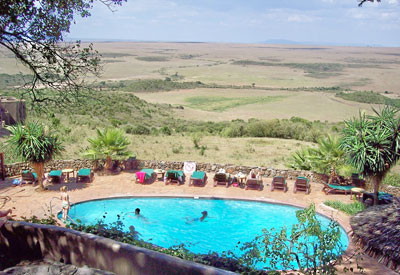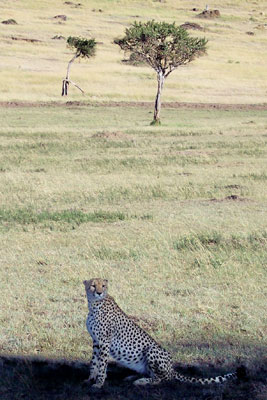Kenya and Tanzania: Nairobi to Masai Mara
This item appears on page 61 of the May 2011 issue.
by Randy Keck (First of three parts, go to part two or part three)
After experiencing many enjoyable visits to Southern Africa over the years, in late February 2011 I finally had the opportunity to visit the East African wildlife safari stalwarts Kenya and Tanzania. My solo journey was partially hosted by longtime ITN advertiser Sita World Tours and, with a few additions and minor modifications, was similar to their “Kenya and Tanzania Highlights” tour.
The focus of the itinerary was visiting the majority of the most famed and most visited national parks and reserves in both countries, sometimes referred to as the “East Africa safari circuit.” My primary intent on this journey was to experience, on multiple game drives, the amazing array of African wildlife at each destination.
Being accommodated at the well-located Serena Hotels safari lodges and tented camps proved to be an integral part of my overall safari experience. Most were within national park and reserve boundaries, and all offered quality accommodation, excellent service and consistently impressive and healthy dining options, with much of the food sourced from nearby villages.
In particular, the range and quality of fresh fruits and freshly squeezed juices on offer at all the Serena properties were the best I have experienced in my extensive travels.
Getting high
Aware that my itinerary was to be within the immediate equatorial zone, I had expected to experience some real extremes of heat. What I had not realized was that almost all of my journey would be conducted at elevations in excess of 4,000 feet, with four destinations over a mile high, one of them at more than 7,500 feet.
The cool mornings and evenings at elevation in this region of equatorial Africa are utterly delightful and help explain why so many Europeans and other Westerners over the last century and a half have become enthralled with the region.
Nairobi to Sweetwaters
On arrival in Nairobi, I enjoyed a pleasant evening at the centrally located yet leafy and relaxed Nairobi Serena Hotel.
After a bountiful breakfast poolside the following morning, I departed the city with my guide and new friend, Nickolas, headed northbound for Sweetwaters Game Reserve, dubbed Sweetwaters by the locals because of the fresh, sweet water that can be tapped from the ground in the area. Appealing pineapple plantations and numerous farms dotted the landscape en route.
Sweetwaters (elevation, 5,938 feet) proved to be an important inclusion to my itinerary because of the opportunity to visit the 200-acre chimpanzee sanctuary, where orphaned and other at-risk chimps are introduced and rehabilitated, learning to fend for themselves while living in a colony in a protected environment.
Additionally, the Sweetwaters Game Reserve is the only place it is possible to see all three varieties of African rhinos: black, southern white and the rare, nearly extinct northern white rhino of which, reputedly, only eight remain in existence, four of which are in the protected private Sweetwaters reserve. This place has East Africa’s largest population of black rhinos, with 78.
The Sweetwaters Tented Camp was, indeed, a haven of tranquility, and most of the tents faced a large water hole that was frequented throughout the day and evening by a large variety of animals and birds.
Two game drives at Sweetwaters produced a surprisingly wide array of animals although no cats.
Masai Mara bound
After, regretfully, only a single night at Sweetwaters, my morning flight from the nearby Nanyuki airstrip in a seven-seat Safari Link aircraft provided a bird’s-eye view of the rural Kenyan landscape as we ventured to the far southwest boundary of the country and the famous Masai Mara Game Reserve. Extending to the Tanzania border, the Mara then becomes the equally famous and several-times-larger Tanzanian Serengeti.
The Mara Serena Safari Lodge is perched high on a hill at an elevation of 5,321 feet, offering nearly 360-degree views across the forests, river and endless grassy plains that comprise the Masai Mara.
Truly one of Africa’s and the world’s most abundant wildlife sanctuaries, the Mara, in concert with the neighboring Serengeti, is where the planet’s largest animal migration takes place annually, involving up to a million or more wildebeest accompanied by several hundred thousand gazelle and zebra.
Generally, the animals are in the Mara from August to October before moving toward the short-grass plains in the southeast of the Serengeti once the rains begin to fall. They calve during late January and February, then in March begin moving north and westward through the Western Corridor, where the rut takes place, and then back to the Mara.
Mara game drives astound
Game drives in the Mara, however, yield a treasure trove of viewing in all seasons, with lions, leopards and cheetahs being the prized viewing treasures for many visitors.
Our game drives were conducted in ideally adapted, four-wheel-drive, extended Toyota Land Cruiser safari vehicles. On the game drives, we sighted all the cats in relative abundance, including a lion pride feasting on a freshly taken zebra and a huge leopard guarding his impounded impala bounty.
We saw the Big Five and marveled at the wildlife diversity. One morning game drive concluded on the banks of the Mara River, where a short walk brought us to a clearing overlooking a huge and very active hippo pool. There, the hotel staff had prepared a surprise: a full breakfast, including an omelet station.
The chorus of birds and the melodic honking from the hippo pool provided musical accompaniment for a truly magical experience.
Next month I continue describing my East Africa exploration from Amboseli to Ngorongoro Crater.
For information on the 11-day, 10-night “Kenya and Tanzania Highlights” tour ($5,120-$6,820 per person, double occupancy, excluding international airfare) and Sita’s other African itineraries and tours worldwide, contact Sita World Tours (16250 Ventura Blvd., Ste. 300, Encino, CA 91436; 800/421-5643).
Keck's Beyond the Garden Wall
❝ One may depart wild Africa,
but wild Africa will not depart the one
The haunting lure to return remains ever present ❞
— Randy reflecting the sentiments of many who have visited the wilds of East Africa


